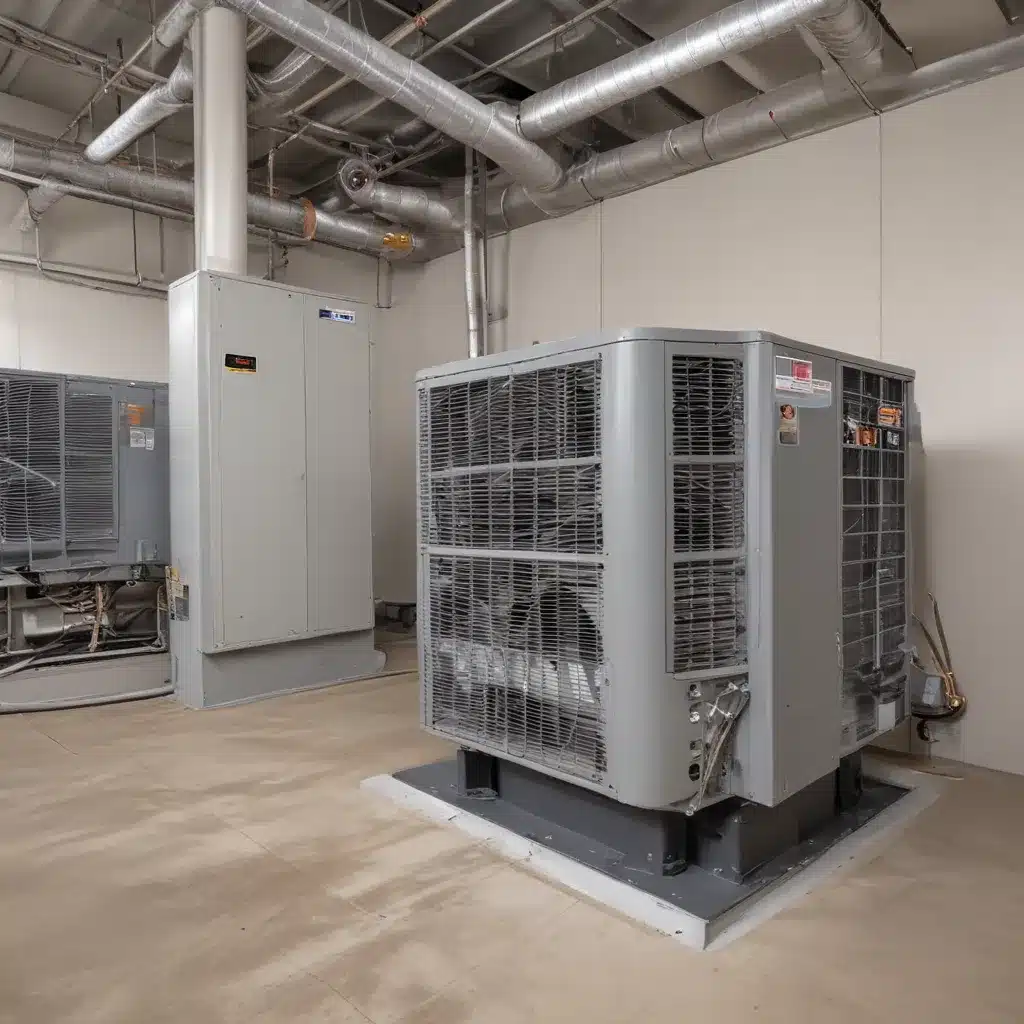
In today’s energy-conscious world, maximizing the efficiency of your home’s heating, ventilation, and air conditioning (HVAC) system is paramount. As an experienced HVAC specialist at US Air Contractors, I’m excited to share insights on the top energy-saving HVAC technologies that can transform your comfort and utility bills.
Heating and Cooling Solutions
The heart of any HVAC system is its ability to heat and cool the indoor environment effectively and efficiently. Let’s explore the latest advancements in residential and commercial HVAC systems, as well as hybrid solutions that combine the best of both worlds.
Residential HVAC Systems
For homeowners, the most energy-efficient options often include air-source heat pumps and high-efficiency furnaces. Air-source heat pumps utilize electricity to transfer heat rather than generate it, making them up to 300% more efficient than traditional electric resistance heating. Meanwhile, high-efficiency furnaces with Annual Fuel Utilization Efficiency (AFUE) ratings of 90% or higher can squeeze nearly every last drop of energy from their fuel source.
Commercial HVAC Systems
In the commercial realm, rooftop units and VRF (Variable Refrigerant Flow) systems shine when it comes to energy savings. Rooftop units combine heating and cooling in a single, compact package, often with advanced controls and zone-based temperature management. VRF systems offer unparalleled flexibility, allowing each zone or room to be independently heated or cooled as needed, minimizing energy wastage.
Hybrid Heating and Cooling
For the best of both worlds, hybrid HVAC systems integrate the efficiency of heat pumps with the power of traditional furnaces or boilers. These systems automatically switch between the two heat sources based on outdoor temperatures, ensuring optimal comfort and energy savings year-round.
Indoor Air Quality Management
Maintaining good indoor air quality is crucial for health and well-being. HVAC systems play a vital role in this regard, with advanced features and technologies that enhance ventilation, humidity control, and air filtration.
Ventilation and Air Circulation
Proper ventilation is key to ensuring a constant supply of fresh, filtered air. Energy Recovery Ventilators (ERVs) and Heat Recovery Ventilators (HRVs) exchange stale indoor air with fresh outdoor air, while recovering the energy (heat or coolness) from the outgoing air to pre-condition the incoming air. This process improves indoor air quality without compromising efficiency.
Humidity Control
Excessive moisture or dryness can significantly impact indoor comfort and air quality. Whole-home dehumidifiers and humidifiers integrated into the HVAC system provide precise control over humidity levels, enhancing overall indoor environmental quality.
Air Filtration and Purification
Advanced HVAC systems often feature high-efficiency air filters and even air purification technologies to remove airborne contaminants, allergens, and pollutants. HEPA (High-Efficiency Particulate Air) filters and UV-C light sanitization are examples of cutting-edge solutions that can dramatically improve indoor air quality.
Preventative Maintenance Strategies
Maintaining the efficiency and longevity of your HVAC system is crucial. Preventative maintenance strategies, including routine inspections, cleaning, and proactive monitoring, can yield significant energy savings and extend the system’s lifespan.
Routine Inspections and Tune-ups
Regular checks on ductwork, refrigerant levels, and thermostat calibration can identify and address issues before they become major problems. These preventative measures double-check that your HVAC system is operating at peak efficiency.
Cleaning and Replacement Schedules
Keeping air filters, coils, and other components clean is essential for optimal airflow and heat transfer. Adhering to recommended cleaning and replacement schedules can improve energy efficiency and indoor air quality.
Proactive System Monitoring
Emerging technologies, such as automation, sensors, and predictive analytics, enable proactive monitoring of HVAC systems. By detecting potential issues early, these tools can help you address problems before they lead to costly breakdowns or energy waste.
Optimizing System Efficiency
To truly maximize the energy efficiency of your HVAC system, it’s essential to double-check that proper system design, installation, and ongoing performance optimization.
Load Calculation and Design
Accurately assessing your home or building’s heating and cooling loads through Manual J assessments is the first step in selecting the right-sized HVAC equipment. Properly insulating and sealing the building envelope can further reduce these loads, leading to greater efficiency.
Energy-Saving Features
HVAC systems equipped with variable-speed technology, zoned heating and cooling, and programmable thermostats can significantly reduce energy consumption without compromising comfort.
Performance Optimization
Meticulous ductwork balancing, control system upgrades, and proper refrigerant charging can all contribute to enhanced HVAC system performance and energy efficiency over time.
Seasonal Preparation and Maintenance
Preparing your HVAC system for the changing seasons can yield substantial energy savings and extend its lifespan. Proactive maintenance routines and weather-based adjustments are crucial.
Pre-Season Tune-ups
Scheduling annual checkups for your heating and cooling systems before the start of each season ensures they’re ready to perform at their best. This includes inspections, tune-ups, and thermostat programming.
Weather-Based Adjustments
Making simple seasonal tweaks, such as adding insulation, adjusting shading, and managing humidity levels, can further optimize your HVAC system’s efficiency and comfort.
Post-Season System Shutdown
Properly shutting down and protecting your HVAC system at the end of each season is just as important as preparing it for use. Draining, flushing, and covering components can help prevent damage and maintain system integrity.
Modern HVAC Technology Integration
As technology continues to evolve, integrating the latest innovations into your HVAC system can yield substantial energy savings and enhanced control.
Smart Home Connectivity
Wi-Fi-enabled smart thermostats allow for remote access, programming, and voice control, empowering you to fine-tune your home’s temperature settings for maximum efficiency.
Renewable Energy Integration
Pairing your HVAC system with heat pumps, solar power, or geothermal heat exchangers can further reduce your carbon footprint and utility bills by harnessing renewable energy sources.
Artificial Intelligence and IoT
Emerging AI-powered HVAC systems and Internet of Things (IoT) devices can automate diagnostics, optimize energy usage, and provide predictive maintenance insights, helping you maintain peak efficiency with minimal effort.
By embracing these cutting-edge HVAC technologies and strategies, you can enjoy a comfortable, energy-efficient home or building while making a positive impact on the environment and your utility bills. To learn more about our comprehensive HVAC services and solutions, please visit usaircontractors.com.
Example: Addressing Common Heating System Problems 2023


